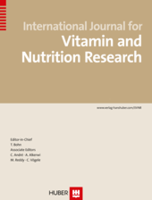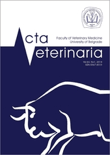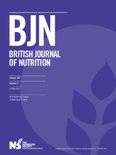
Genes and Nutrition
Scope & Guideline
Empowering Research in Genetics and Nutrition
Introduction
Aims and Scopes
- Genetic-Nutritional Interactions:
The journal emphasizes the study of how genetic variations affect individual responses to dietary factors, influencing health outcomes and disease susceptibility. - Molecular Mechanisms:
Research often delves into the molecular and cellular mechanisms through which nutrients exert their effects on gene expression and cellular function, providing insights into the biochemical pathways involved. - Clinical Applications:
There is a consistent focus on translating findings into clinical practice, exploring how dietary interventions can be personalized based on genetic profiles to improve health outcomes. - Public Health Implications:
The journal addresses the public health significance of nutrition and genetics, advocating for informed dietary policies and practices that consider genetic predispositions. - Emerging Technologies:
Utilization of advanced methodologies such as multiomics approaches, Mendelian randomization, and gene editing technologies to investigate the intricate relationships between diet, genes, and health.
Trending and Emerging
- Personalized Nutrition:
There is a growing emphasis on personalized nutrition, where dietary recommendations are tailored based on an individual's genetic makeup to optimize health outcomes. - Multiomics Approaches:
The integration of genomics, proteomics, metabolomics, and microbiomics in research is on the rise, allowing for a comprehensive understanding of how nutrition affects health at multiple biological levels. - Gut Microbiome Interactions:
Research focusing on the gut microbiome's role in mediating the effects of diet on health is increasingly prevalent, highlighting its importance in nutrition and genetic interactions. - Nutritional Genomics:
The field of nutritional genomics, which studies the effects of nutrients on gene expression, is gaining traction, with studies exploring how dietary components influence genetic pathways. - Impact of Dietary Patterns on Disease Risk:
Emerging studies are increasingly focusing on the impact of specific dietary patterns (e.g., anti-inflammatory diets) on the risk of chronic diseases, reflecting a shift towards holistic dietary assessments.
Declining or Waning
- Traditional Nutritional Studies:
There is a noticeable decline in studies focused solely on traditional nutrition, such as basic dietary surveys and nutrient intake analysis, as the journal shifts towards more integrated approaches that consider genetic factors. - Single Nutrient Focus:
Research focusing on the effects of single nutrients in isolation is becoming less common, with a trend towards examining the synergistic effects of multiple nutrients and their interactions with genetic factors. - Static Dietary Guidelines:
Static dietary recommendations that do not consider individual genetic variability are less frequently published, as there is a growing emphasis on personalized nutrition based on genetic predispositions. - Basic Metabolic Studies:
The journal seems to be moving away from basic metabolic studies that do not incorporate genetic or molecular insights, favoring research that connects metabolic pathways with genetic influences. - Generic Public Health Recommendations:
Generic public health recommendations without a genetic context are appearing less frequently, as the focus shifts towards more tailored and specific dietary interventions.
Similar Journals

NUTRITION
Connecting research with real-world dietary solutions.NUTRITION is a prestigious peer-reviewed journal published by Elsevier Science Inc, dedicated to advancing the field of dietary practices and metabolism. With an ISSN of 0899-9007 and an E-ISSN of 1873-1244, this journal has been serving the academic community since its inception in 1987, showcasing high-quality research and reviews through 2024. Recognized for its significant contributions to the fields of Endocrinology, Diabetes and Metabolism and Nutrition and Dietetics, NUTRITION holds a commendable Q2 category ranking in both areas, reflecting its impactful presence with a Scopus rank of #26 out of 140 and #51 out of 244 in its respective categories. The journal primarily aims to disseminate innovative research findings that illuminate the complex interplay between nutrition and health, fostering a deeper understanding among researchers, healthcare professionals, and students alike. By bridging scientific inquiry with practical application, NUTRITION plays a vital role in shaping public health policies and dietary recommendations worldwide.

INTERNATIONAL JOURNAL FOR VITAMIN AND NUTRITION RESEARCH
Empowering researchers in the field of nutrition and health.INTERNATIONAL JOURNAL FOR VITAMIN AND NUTRITION RESEARCH, published by HOGREFE AG-HOGREFE AG SUISSE, stands as a pivotal resource in the intersecting realms of nutrition and health. With a rich publication history spanning from 1971 to 2024, this esteemed journal provides a platform for innovative research in the fields of Endocrinology, Diabetes and Metabolism, Medicine (miscellaneous), and Nutrition and Dietetics. The journal holds a respectable Q3 category ranking in these disciplines for 2023, attesting to its influence within the academic community. Although it does not offer open access, the ISSN 0300-9831 and E-ISSN 1664-2821 identifiers ensure its broad accessibility. Researchers, practitioners, and students alike benefit from its rigorous peer-reviewed content, which greatly contributes to the advancement of knowledge and best practices in nutrition research. The journal's commitment to excellence is further exemplified by its notable rankings in Scopus, where it achieves impressive standings across relevant categories. For anyone involved in the exploration of vitamins, nutrition, and their crucial roles in human health, this journal is an essential tool for staying informed and engaged with the latest scientific developments.

ACTA VETERINARIA-BEOGRAD
Transforming veterinary practices with cutting-edge discoveries.ACTA VETERINARIA-BEOGRAD is a distinguished academic journal dedicated to the field of veterinary science, focusing on a broad spectrum of topics pertinent to veterinary medicine and animal health. Published by SCIENDO, this journal has been an open-access resource since 2014, facilitating the dissemination of valuable research findings and innovations to a global audience. With an ISSN of 0567-8315 and an E-ISSN of 1820-7448, it plays a critical role in promoting accessible knowledge in veterinary practices while contributing to the advancement of the field. Located in Poland, this journal notably ranks in the Q3 quartile for veterinary studies, reflecting its ongoing commitment to quality and relevance. The journal welcomes contributions from a diverse range of veterinary disciplines, making it a vital platform for researchers, practitioners, and students alike who aspire to advance their understanding and impact within the veterinary community.

FOLIA BIOLOGICA
Bridging Theory and Practice in BiologyFOLIA BIOLOGICA, published by Charles University Prague, First Faculty of Medicine, is an esteemed academic journal that has been contributing to the fields of Biochemistry, Cell Biology, Developmental Biology, Genetics, Immunology, and Molecular Biology since its inception in 1961. With an ISSN of 0015-5500, this journal serves as a vital platform for researchers and professionals to disseminate their findings and advance knowledge within these disciplines. Despite its current Category Quartiles ranking in the lower tiers (Q3 and Q4), FOLIA BIOLOGICA continues to provide valued insights and foster scholarly dialogue, particularly in its paralleled fields. The journal is headquartered in Prague, Czech Republic, and operates without Open Access options, which emphasizes its focus on curated, peer-reviewed content essential for academicians and students. By bridging theoretical and practical knowledge, FOLIA BIOLOGICA remains committed to enriching the scientific community and serving as a cornerstone for future research innovations.

Annual Review of Nutrition
Shaping the Future of Dietetics and Nutrition KnowledgeThe Annual Review of Nutrition, published by Annual Reviews, serves as a cornerstone for researchers and professionals in the fields of Nutrition and Dietetics. Established in 1981 and converging towards its 2024 edition, this esteemed journal holds a prestigious Q1 rank in both Medicine (Miscellaneous) and Nutrition and Dietetics, showcasing its significant impact and influence within the academic community. With an impressive Scopus ranking positioning it in the top tier at #3 out of 140 in Nutrition and Dietetics (98th percentile) and #14 out of 398 in Medicine (96th percentile), the journal continues to drive innovation and knowledge dissemination in nutritional science. Although not Open Access, the Annual Review of Nutrition is essential for students, researchers, and practitioners seeking comprehensive and cutting-edge reviews that synthesize the rapidly evolving landscape of nutrition research, thereby fostering informed decisions and practices in health and wellness.

Human Gene
Empowering the Future of Genetic ResearchHuman Gene is an innovative open access journal published by ELSEVIER, dedicated to the ever-evolving field of genetics. Established in 2022, this journal serves as a vital resource for researchers, professionals, and students alike, aiming to facilitate the dissemination of groundbreaking research and advancements in both basic and clinical genetics. With an ISSN of 2773-0441, Human Gene focuses on providing a platform for high-quality studies that investigate genetic mechanisms, their implications in health and disease, and novel therapeutic strategies. The journal currently holds a Q4 ranking in both Genetics and Clinical Genetics categories, reflecting its emerging status within the scientific community, and strives to enhance its impact to better serve an engaged audience. With its base in Amsterdam, Netherlands, Human Gene is committed to making research accessible through its open access model, inviting contributions that advance our understanding of human genetics and foster collaboration across disciplines.

JOURNAL OF NUTRITIONAL SCIENCE AND VITAMINOLOGY
Innovating Insights in Nutrition and Disease PreventionJOURNAL OF NUTRITIONAL SCIENCE AND VITAMINOLOGY, published by the CENTER ACADEMIC PUBL JAPAN, serves as a vital platform for scientific inquiry into the fields of nutrition and vitaminology. Established in 1973, this peer-reviewed journal not only focuses on the biochemical aspects of nutrition but also addresses broader implications on health and disease prevention. With an ISSN of 0301-4800 and an E-ISSN of 1881-7742, it provides researchers, health professionals, and students access to novel studies and reviews that advance understanding in nutritional science. Though currently not an open access journal, it maintains a respectable position in academia, with a 2023 Quartile Q3 ranking in both Medicine (miscellaneous) and Nutrition and Dietetics, and Scopus rankings reflecting its growing influence. As the journal converges towards 2024, it remains committed to enlightening its audience on the latest research developments and fostering discourse within this essential scientific community.

BRITISH JOURNAL OF NUTRITION
Elevating Nutritional Research to New HeightsThe British Journal of Nutrition, a premier publication in the field of nutrition and dietetics, is brought to you by Cambridge University Press. Established in 1947, this journal has consistently provided a platform for groundbreaking research and innovation in the domain of nutrition, boasting an impressive converged timeline extending to 2024. Recognized for its high academic standards, it proudly holds a Q1 ranking in Medicine (miscellaneous) and a Q2 ranking in Nutrition and Dietetics as of 2023, reflecting its impact and relevance in the scientific community. With a Scopus rank of 75 out of 398 in Medicine and 38 out of 140 in Nutrition and Dietetics, the journal remains a vital resource for researchers, professionals, and students seeking to enhance their knowledge and understanding of nutritional science. While the journal is not open access, it offers a wealth of valuable insights, making it an essential addition to any academic collection focused on health and nutrition.

Advances in Nutrition
Pioneering Insights for a Healthier FutureAdvances in Nutrition is a premier academic journal published by Elsevier Science Inc, dedicated to advancing the field of nutritional science through rigorous research and critical reviews. Since its inception in 2010, this influential journal has positioned itself at the forefront of its discipline, boasting an impressive Q1 ranking in Food Science, Medicine (miscellaneous), and Nutrition and Dietetics as of 2023. With its robust impact factor and distinguished standing, it ranks within the top percentiles of its categories, making it a vital resource for researchers, professionals, and students alike. The scope of the journal encompasses a diverse range of topics related to nutrition, providing a platform for innovative research that influences dietary practices and public health policies. Although this journal currently does not offer open access, it remains accessible through institutional subscriptions, enhancing its outreach and impact in the scientific community.

Clinical Nutrition ESPEN
Elevating Standards in Nutrition Science and PracticeClinical Nutrition ESPEN is a distinguished journal published by ELSEVIER, focusing on the critical intersection of clinical nutrition and metabolic health. With an ISSN of 2405-4577, this journal serves as an essential resource for researchers, practitioners, and students in the fields of Endocrinology, Diabetes and Metabolism as well as Nutrition and Dietetics. Operating out of the United Kingdom, it has garnered a respectable Q2 ranking in both categories for 2023, indicating its significant impact and relevance in the field. Although it does not follow an open access model, the journal offers valuable insights into contemporary nutrition research, clinical practices, and dietary interventions, making it a vital tool for those committed to improving patient outcomes through nutritional science. In its evolving journey, covering work from 2015 to 2024, Clinical Nutrition ESPEN continues to shape the dialogue in nutrition research, addressing pressing health challenges and fostering innovation in dietetic practice.